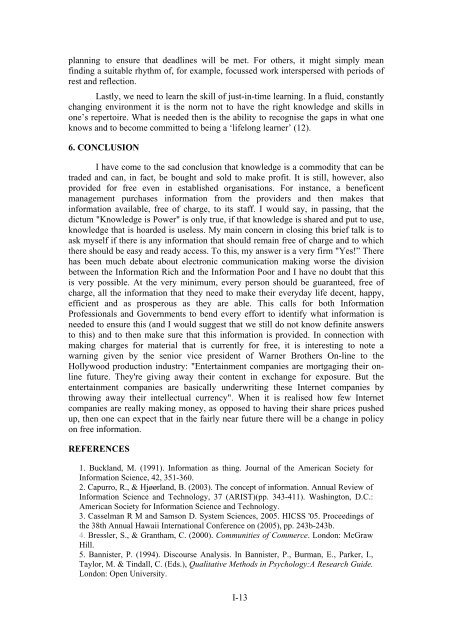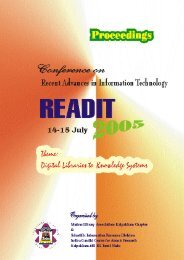READIT-2007 - Indira Gandhi Centre for Atomic Research
READIT-2007 - Indira Gandhi Centre for Atomic Research
READIT-2007 - Indira Gandhi Centre for Atomic Research
Create successful ePaper yourself
Turn your PDF publications into a flip-book with our unique Google optimized e-Paper software.
planning to ensure that deadlines will be met. For others, it might simply mean<br />
finding a suitable rhythm of, <strong>for</strong> example, focussed work interspersed with periods of<br />
rest and reflection.<br />
Lastly, we need to learn the skill of just-in-time learning. In a fluid, constantly<br />
changing environment it is the norm not to have the right knowledge and skills in<br />
one’s repertoire. What is needed then is the ability to recognise the gaps in what one<br />
knows and to become committed to being a ‘lifelong learner’ (12).<br />
6. CONCLUSION<br />
I have come to the sad conclusion that knowledge is a commodity that can be<br />
traded and can, in fact, be bought and sold to make profit. It is still, however, also<br />
provided <strong>for</strong> free even in established organisations. For instance, a beneficent<br />
management purchases in<strong>for</strong>mation from the providers and then makes that<br />
in<strong>for</strong>mation available, free of charge, to its staff. I would say, in passing, that the<br />
dictum "Knowledge is Power" is only true, if that knowledge is shared and put to use,<br />
knowledge that is hoarded is useless. My main concern in closing this brief talk is to<br />
ask myself if there is any in<strong>for</strong>mation that should remain free of charge and to which<br />
there should be easy and ready access. To this, my answer is a very firm "Yes!” There<br />
has been much debate about electronic communication making worse the division<br />
between the In<strong>for</strong>mation Rich and the In<strong>for</strong>mation Poor and I have no doubt that this<br />
is very possible. At the very minimum, every person should be guaranteed, free of<br />
charge, all the in<strong>for</strong>mation that they need to make their everyday life decent, happy,<br />
efficient and as prosperous as they are able. This calls <strong>for</strong> both In<strong>for</strong>mation<br />
Professionals and Governments to bend every ef<strong>for</strong>t to identify what in<strong>for</strong>mation is<br />
needed to ensure this (and I would suggest that we still do not know definite answers<br />
to this) and to then make sure that this in<strong>for</strong>mation is provided. In connection with<br />
making charges <strong>for</strong> material that is currently <strong>for</strong> free, it is interesting to note a<br />
warning given by the senior vice president of Warner Brothers On-line to the<br />
Hollywood production industry: "Entertainment companies are mortgaging their online<br />
future. They're giving away their content in exchange <strong>for</strong> exposure. But the<br />
entertainment companies are basically underwriting these Internet companies by<br />
throwing away their intellectual currency". When it is realised how few Internet<br />
companies are really making money, as opposed to having their share prices pushed<br />
up, then one can expect that in the fairly near future there will be a change in policy<br />
on free in<strong>for</strong>mation.<br />
REFERENCES<br />
1. Buckland, M. (1991). In<strong>for</strong>mation as thing. Journal of the American Society <strong>for</strong><br />
In<strong>for</strong>mation Science, 42, 351-360.<br />
2. Capurro, R., & Hjøørland, B. (2003). The concept of in<strong>for</strong>mation. Annual Review of<br />
In<strong>for</strong>mation Science and Technology, 37 (ARIST)(pp. 343-411). Washington, D.C.:<br />
American Society <strong>for</strong> In<strong>for</strong>mation Science and Technology.<br />
3. Casselman R M and Samson D. System Sciences, 2005. HICSS '05. Proceedings of<br />
the 38th Annual Hawaii International Conference on (2005), pp. 243b-243b.<br />
4. Bressler, S., & Grantham, C. (2000). Communities of Commerce. London: McGraw<br />
Hill.<br />
5. Bannister, P. (1994). Discourse Analysis. In Bannister, P., Burman, E., Parker, I.,<br />
Taylor, M. & Tindall, C. (Eds.), Qualitative Methods in Psychology:A <strong>Research</strong> Guide.<br />
London: Open University.<br />
I-13

















